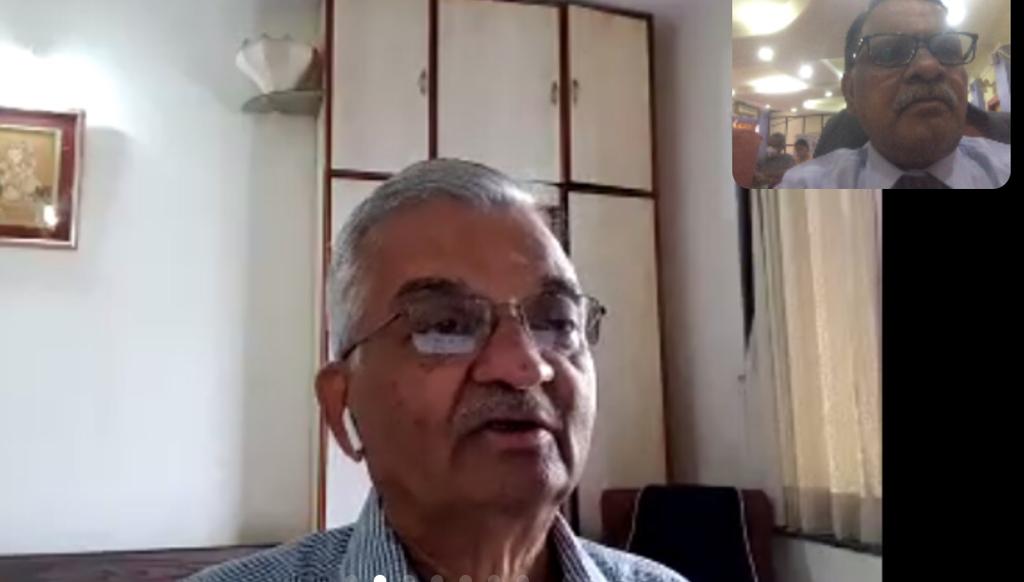Kakodkar calls for cultural revolution in education to be top in the world
Former Chairperson of Atomic Energy Commission Dr Anil Kakodkar as sought a cultural revolution in the education sector in the country, for our universities to be among the top in the world.
Kakodkar was in conversation with students of physics, scientists and science communicators yesterday, on his book Fire and Fury Transforming India’s Strategic Identity. The hybrid programme, with a small audience attending physically at the Department of Physics, Mumbai University and a larger audience on an online platform, was organised jointly by Department of Physics in association with National Centre for Science Communicators (NCSC) on the occasion of International Youth Day and to mark the fiftieth year of the establishment of the Department of Physics. The moderators for the programme were Chariman NCSCDr A P Jayaraman , Deputy Director Kelkar Education TrustsDr Siddhivinayak Barve and Dean, Science and TechnologyMumbai University Dr Anuradha Majumdar.
Comparing Indian universities with world class universities, Kakodkar said that there is a huge gap between what exists there and what exists in universities in India. “You cannot be among top 50 or 25 in the world by merely setting up a university and calling it world class university. Those (the top universities in the world) are based on a certain philosophy. Those institutions are based on certain style of management. Those institutions have, you know, in terms of autonomy, in terms of working philosophy in terms of culture,” he said.

The world-renowned nuclear scientist said that some of the top universities in the world are few hundred or several hundred years old. There were universities as old as 1,000 years, he said, giving the example of Nalanda University of India. “It was the top of the table university in the world at that time and it ran for several years, before it was unfortunately destroyed. We had our own culture at some stage, but unfortunately we have missed that culture.” He said there is a need to revisit the culture of Nalanda or of today’s Stanford University and added that India should have those kind of universities. “If we have around 100 universities of that kind, I am 110 per cent confident that India would be the top country in the world,” he asserted.
According to Kakodkar, when an educational institute celebrates its golden jubilee, the institute should be like pure gold. “It is not about counting time, but about counting of culture of excellence and this is what happens with top universities in the world; we need to achieve that,” he added.
Replying to a question on the embargo on India, following the nuclear tests, Kakodkar said that many countries in the world did not want India to get into nuclear weapon capabilities. Uranium was in short supply and the embargo (on the supply of uranium) delayed our nuclear power programme, according to Kakodkar.
“Although the embargoes were supposed to prevent India going the nuclear weapons way, the embargo actually accelerated deployment of nuclear power in India and so it has not gone in the interest of those countries (declaring an embargo). Gradually, the atmosphere changed, with a change in the mindset and it was felt that India and the rest of the world could cooperate. They wanted to certainly contain the nuclear weapon programme of India, but wanted India’s nuclear programme to grow,” Kakodkar told the audience.
According to him, India took a stand that what the country should do and what it should not, shall be decided by India in an autonomous way, without anybody else telling us what to do. “At the same time, wherever we got cooperation from outside, India has always been very responsible in making sure that that it was restricted to the peaceful domain. For example, Tarapur 1 and 2 were set up with international cooperation and IAEA (International Atomic Energy Agency) safeguards on those reactors, right from day one since early 60s. So, it was consistent and we adhere to that line saying that we are prepared to cooperate internationally, in fact would like to, as it is in our interest, just as it is in their interest,” the scientist said.
He stated that now we have access to uranium and our power reactors are working at very high capacity factors, around 80 to 85 per cent, some even 90 at per cent capacity in fact their performance is compatible with the world standards.
